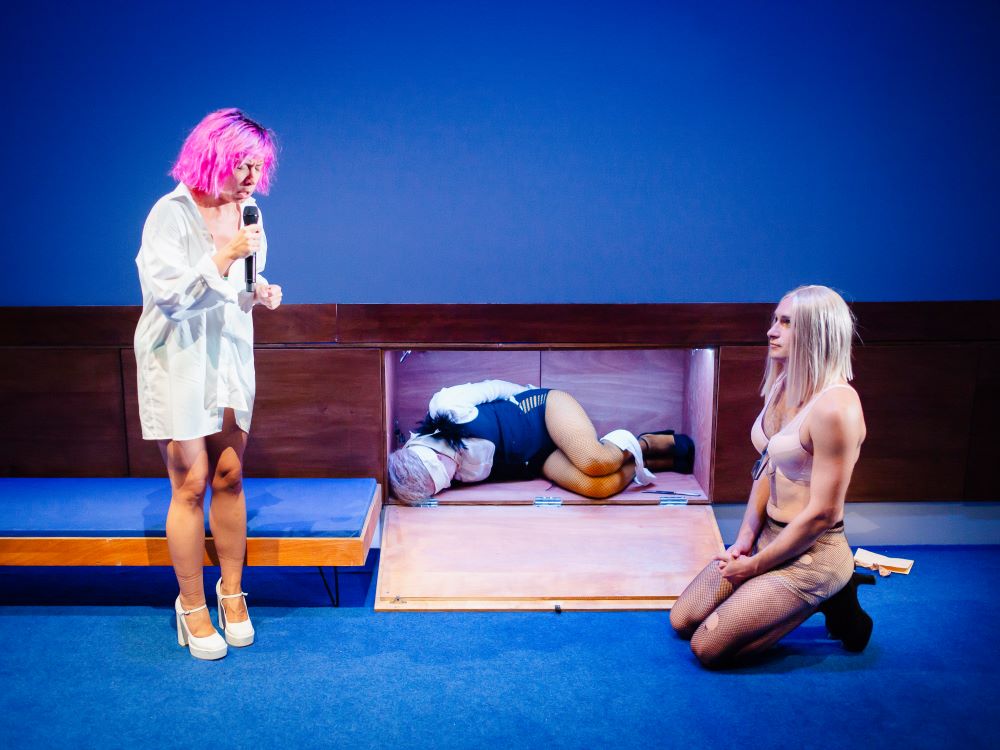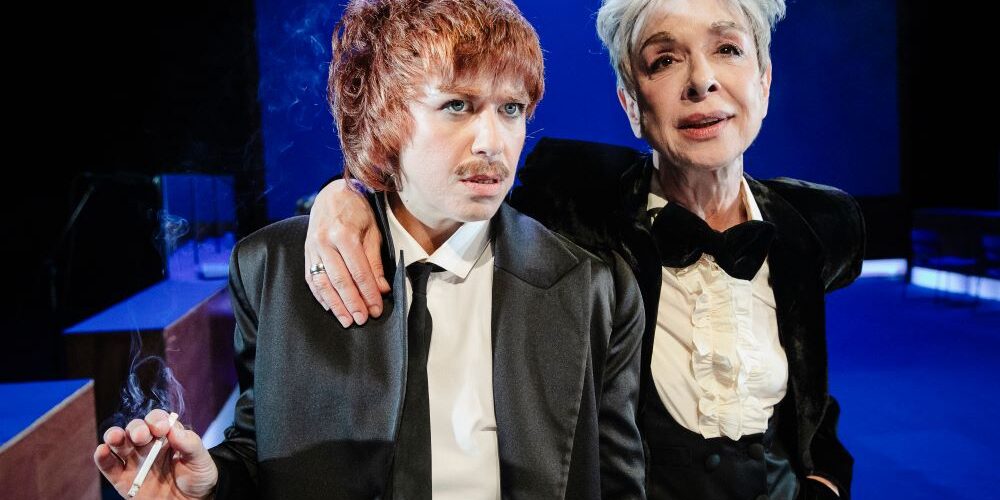Zagreb Youth Theatre, premiere 23rd September 2023
Gender is central to Grzegorz Jarzyna’s loose adaptation of Shakespeare’s comedy, Twelfth Night. Jarzyna’s and dramaturg Roman Pawłowski’s reimagining is inspired by the Renaissance comedy of errors and the motif of cross-dressing, with men dressing as women and vice versa.
The play’s plot centres on a cross-dressing party organized to mark the seventh marriage anniversary of Italian Prince Olivio (Dado Ćosić) and his wife Orsina (Anđela Ramljak).
This gender intervention applies to the other characters too; Malvolio is the hotel manager Malvolia (Katarina Bistrović Darvaš), Feste is a (failed) pop-star and party planner (Petra Svrtan), Maria is Mario (Mateo Videk), Olivio’s assistent and secret lover, Sir Toby is Tomassa (Doris Šarić Kukuljica), Olivio’s aunt, and Sir Andrew is Andrea (Barbara Prpić), a rich English tourist.
The most interesting and innovative intervention comes in form of Violx, later Cesario (played by Mia Melcher), a non-binary character in which both twins, Viola and Sebastian, are combined in one. This idea is quite amusing, especially given the context of the mix up between the twins that happens towards the end of Shakespeare’s text.
Jarzyna’s production, the first premiere of the season at ZKM, is co-produced with the Dubrovnik Summer Festival, a Croatian festival with an impressive history, where it opened this July, on the Lovrjenac Fort, nowadays best known internationally as the Red Keep from the TV show Game of Thrones. (Interestingly, on the Dubrovnik Tourist Board’s website, the description of the fort, it states that it’s been compared to Elsinore and thus used as the settings of Hamlet).
Shakespeare set his play in Illyria, the historical name of the western Balkans but we are warned in the footnote that this shouldn’t be taken literally (at least according to the Croatian translator Milan Bogadonović).
Jarzyna relocates the play to the Hotel Illyria, located at the top of 208 stairs, a detail that would works perfectly in Lovrjenac Fort but doesn’t have quite the same charm when performed at ZKM’s Istra hall. The se, designed by AAFGJAP team, looks intentionally depressing. It’s giving socialist realism ex-Yugoslavian vibes with a lot wood and royal blue, a look not dissimilar from some of the hotels on the Croatian coast. There are mirrors and cupboards surrounding the stage – handy for dressing up – while the lighting (Aleksandar Prowlanski) is used to divide the stage into different rooms when needed. The backdrop functions as a projection wall on which a short film (Ivan Marušić-Klif) is played at the start of the performance, consisting of interviews with people of different ages and genders on what gender and sex mean to them and how they define themselves. As expected, the answers given are somewhat conservative and based on the gender binary, humans are defined by their gender and sex they were assigned at birth, there is no middle ground or in-between.

Twelfth Night, or What you Will – ZKM
The drama starts when Olivio asks to have a separate apartment from his wife Orsina. Fest and Mario say that the goal of the party is to make Orsina realise who she really is and to force Olivio out of the closet in order for Mario to get him back for himself. All this changes with Violx’s enterance – they are bold and browless, dressed in a black and white suit acompanied with red high heel boots. They approach Feste and offer to pay her to get invited to the private party, makes a joke that their yacht crashed on some rocks – an allusion to the misfortune of the twins in the play.
Violx’s appearance at the hotel causes quite a stir, both Orsina/o and Olivio/a fall for them which causes the married couple to part ways in a most awkward fashion by getting into a clumsy physical fight at the party. Orisina/o’s feelings for Violx don’t seem to be geniuine, since just a moment ago she was obsessing over her husband leaving her and asked Violx for help to get him back. Of course, we can give them the benefit of the doubt and explain it via the ‘love at first sight’ trope but it seems more like Violx’s attraction comes from their uniqueness, both Feste and Orsina/o describe them as an angel, a divine creature. Besides, wasn’t Orsina supposed to lose her partner in order to find her true, authentic self? This is a theme that is also discussed at the end of the play between Malvolia and Zoran, that in order to find true, fullfiling love, a person must be true to themselves first. But Orsina ‘finds’ her authentic self only through ‘falling in love’ or ‘what you will with Violx.
This raises the question of whether the characters in Jarzyna’s adaptation are aware of Shakespeare’s text because it sometimes seems like they are, especially, for example when they alternate between speaking in verse and prose. Orisina/o finds an old thick book in her cupboard and reads verses from it, as if quoting Shakespeare. However, while some scenes are entertaining, like the morning-after the party where everyone is still hungover from the night before, a lot of the comedy has been sapped from this adaptation. The pace and rhythm is too slow a lot of the time and the production lacks in energy, something that’s rarely an issue with ZKM’s ensemble. The big ‘cross-dressing’ scene, when the actors are putting on their costumes and changing to a different gender, is uneventful, taking place on the side of the stage so the audience can’t see much of it. Most of the comedic scenes from Shakespeare’s text are incorporated differently to fit the adaptation, and don’t add much to the dynamic.
The last couple of shows in ZKM’s repertoire have tackled current social issues; with My Husband, it was feminism, while The Bald Soprano placed Ionesco’s alienated dialogues into a post-pandemic context. This Twelfth Night dabbles in queerness and gender issues, but the results are mediocre and flat. In the case of Twelfth Night, the queer elements are reduced to cross-dressing and sexuality, more explicitly romantic love. As Violx discusses with Olivio/a in their final dialogue, they can’t be what Olivio/a want them to be because they love someone else, even though Olivio/a wants them to be what they want. However, their love seems to be more banal and desire-driven. The admissions of love from all three happy couples, Orsina-Violx, Olivio-Mario and Feste-Zoran, are demonstrated solely by lustful looks and kisses, with Shakespeare’s verses blanked and his poetry reduced to a political tool.
Credits:
Director: Grzegorz Jarzyna//Text: Grzegorz Jarzyna, Roman Pawłowski//Costume: Anna Axer Fijalkowska// Scenography: AAFGJAP//
Video: Ivan Marušić-Klif// Sound: Marko Levanić, Ivana Starčević Dramaturg: Roman Pawłowski
For tickets and further information, visit: ZeKaEm.hr
Nora Čulić Matošić (1998) is a student of Comparative Literature (MA) at the Faculty of Humanities and Social Sciences in Zagreb. She has written theatre criticism for the Croatian radio programme Theatralia and web portal Kulturpunkt.hr. Besides theatre, her interests are other forms of performing arts (particularly dance performances) and film.








